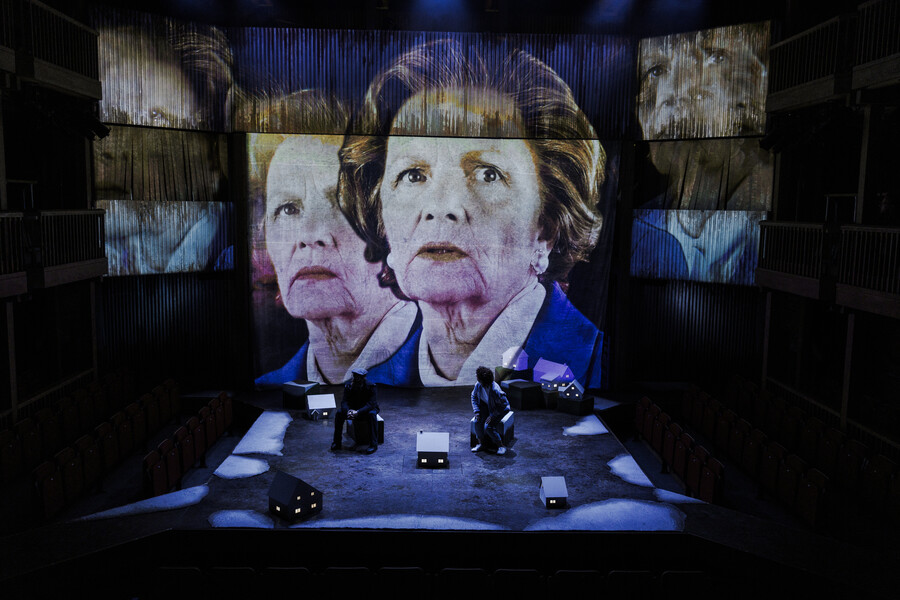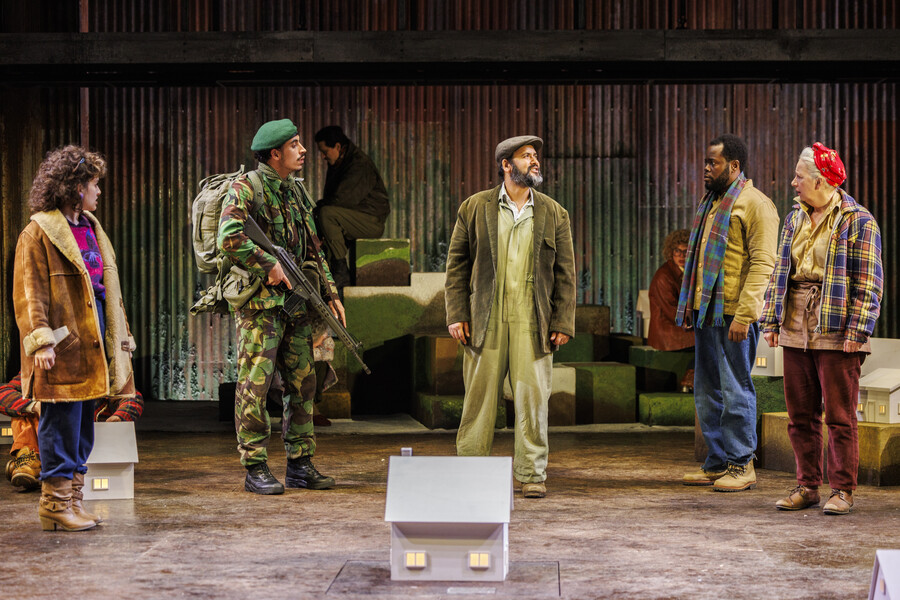
5 August – 16 September
‘Think bigger, think universal, be both intimate and epic.’ This was the task Brad Birch set himself in writing his play about the 1982 Falklands War. The challenge was ambitious and the result somewhat uneven.
Falkland Sound is carefully researched and informative, reminding those who have forgotten, and those who never knew, of the effect of the war in reviving the fortunes of Margaret Thatcher’s government. But theatre needs to do more than inform, and it is through the personal lives of the characters that the audience is touched and moved.
Falkland Sound focuses on a rural settlement of 41 adults and 6 children, miles from the capital Stanley, itself a town of fewer than a thousand. The design (by Aldo Vazquez) a collection of tiny houses on a flat stage, is a stark visual metaphor for the inhabitants’ fragility and isolation. Their nearest landmass, Argentina , is more than 300 miles away. When war breaks out there are no shelters and nowhere to run. All they can do is protect the homes that offer them little protection. A visiting teacher John (Tom Milligan), is the link with the outside world, acting as observer and commentator.
Initially the pace is slow, weighed down by historical background, but as we approach the invasion the action quickens, and we are drawn further into the characters’ lives. Stories emerge through often humorous dialogue in the style of ‘Under Milk Wood’. This is what the play does best, illuminating the geopolitical through detail. There is Geoff (Oliver Hembrough) the odd job man, whose ID bears a photo of Charlie Chaplin in a protest at a new edict, Mary (Sarah Moyle) the shopkeeper, maintaining her shop despite the shortage of goods, Sue (Avita Jay) whose marriages cracks under the pressure of the war. There are victims on both sides. The islanders are appalled by the condition of the Argentine conscripts. These boys may be occupiers, but they are also underfed, inadequately housed, many dying of exposure in the harsh Southern winter. One particular touching thread is the experience of the Argentine scientist, Gabriel (Eduardo Arcelus) an inhabitant of the island, whose discomfort and conflicted loyalties are dramatized when he is cold shouldered in the pub. There could be a play in his story alone.
But with the shift to 1980s London the emotional tension is dispelled. A dissatisfied population shout their rage into microphones, caricature Tories gesticulate like crazy marionettes, journalist’s bark questions, editors manipulate news stories, politicians are treated as absurd and inept. The cacophony of sound and movement is more alienating than dramatic. Thatcher herself is portrayed more successfully, shown first on back projection, using her own words. After the war she emerges in person (Joanne Howarth) in the cartoon version of herself she was to become, emerging from a trapdoor in the stage as if rising from the dead.
Director Aaron Parsons has encouraged strong performances from the islanders and the complexity of domestic and international tension is a difficult subject for the stage, especially when there is no central figure to engage our sympathies. But it’s tempting to believe that a more intense and limited compass would have had greater dramatic impact.
★★★☆☆ Ros Carne 16 August 2023
Photo credit: Ellie Kurttz


